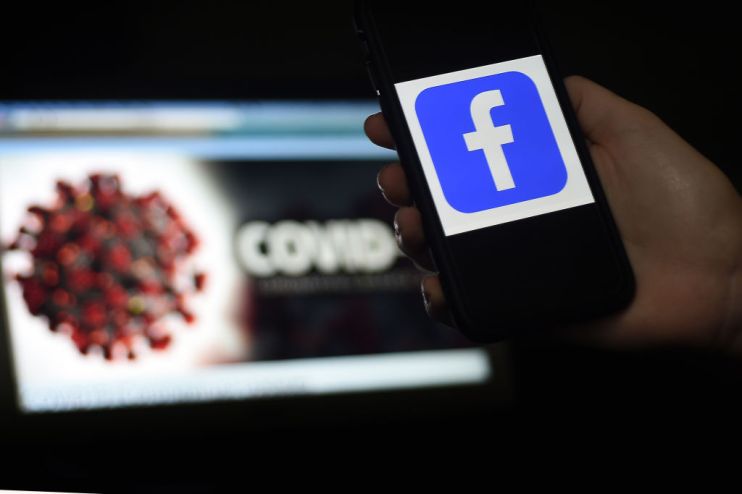Facebook earnings: Shares leap despite lowest growth since 2012

Facebook’s shares jumped almost 10 per cent in after hours trading following a surprisingly upbeat set of first quarter results from the tech giant.
Following Alphabet’s figures earlier this week, all eyes were on Facebook to see how the Covid-19 crisis has hit social media.
Here are three key takeaways from the numbers:
1. The Facebook juggernaut marches on
Facebook posted a 17 per cent rise in revenue to $17.7bn (£14.2bn) in the first three months of the year, beating the average analyst estimate of $17.4bn.
The figures — though positive— mark the company’s slowest quarterly rate of growth since its public listing in 2012.
Facebook said it had suffered a “significant reduction in the demand for advertising” as well as lower pricing of ads, especially in the last three weeks of the quarter.
But the social media platform said it had seen “signs of stability” in the first three weeks of April, with revenue roughly flat year on year.
The optimistic outlook rallied shares, as investors eyed a quick recovery in revenue.
“The strong results are evidence of the strength of Facebook’s business model, its scale and targeting ability as well as its ability to deliver a tangible return on investment for advertisers,” said Christopher Rossbach, portfolio manager of the J. Stern & Co. world stars global equity fund.
“The strong share price reaction after the results is well justified and we expect that these earnings are just another step to Facebook becoming a $1 trillion company.”
While businesses have slashed advertising spend across the board, social media spend has suffered a relatively low drop in investment, and Facebook stands to weather the storm better than traditional media formats.
Yuval Ben-Itzhak, chief executive of social media marketing firm Socialbakers, said: “Social media data shows that ad spend in key regions like North America and Western Europe has started to pick up as savvy marketers look to stay close to their customers as these regions get to grips with the pandemic, which is a good sign that ad revenue will continue to grow for Facebook in the second quarter and onward.”
2. Rebuilding the reputation
Facebook has been no stranger to controversy in recent years, most recently sparking a backlash over its refusal to restrict or fact check political ads.
Alongside other social media firms it has also come under scrutiny over the spread of harmful material posted to online platforms, including a rise in misinformation during the Covid-19 crisis.
But the first-quarter figures revealed a huge rise in engagement across its apps, as people turn to the social media giant’s services to stay connected with family and friends.
Facebook has also rolled out a number of measures to halt fake news during the pandemic, including a new World Health Organization chatbot and limited how often messages can be forwarded on Whatsapp.
“[Facebook’s] reputation as the ‘bad guy’ of social has been hugely mitigated by the ways it has enabled communities to pull together — across Facebook and its property WhatsApp, as individuals have been able to find new ways to support local people in need,” said Tamara Littleton, chief executive of The Social Element.
“Overall, Facebook’s results may not be as strong as usually reported thanks to the Covid-19 crisis impacting most businesses, but it has demonstrated that when push comes to shove, its services are more than a luxury, they’re a necessity.
“This understanding may well play out in its bottom line in the future, when advertisers return knowing that its users are more embedded in its ecosystem than ever.”
3. Monetising the future
Increased screen time may not translate into immediate revenue, but securing user engagement will be crucial as Facebook looks to monetise some of its newer avenues.
Last week the social media firm launched video chat service Messenger Rooms — a clear attempt to cash in on rising demand for video calling and take on the likes of Zoom and Houseparty.
“With the release of group chats and continued investment in Watch, Facebook is poised to further capture consumer time and attention from the 3bn people that use its apps each month,” said Aaron Goldman, chief marketing officer at 4C Insights.
“Looking ahead, these engaged audiences inside closed ecosystems will be prime for monetisation.”
Sophie Lund-Yates, equity analyst at Hargreaves Lansdown, said Facebook had “substantial untapped growth opportunities”.
This includes WhatsApp Pay, the in-app payment system that has been rolled out in India as a rival to Chinese giant Wechat Pay.
“Paying for innovation, as well as higher bills to improve privacy and security, means margins have come under pressure lately, and the current disruption means operating margins will once again shoulder the brunt,” she said.
“While no business is going to pop champagne at the prospect of lower margins this year, margin dilution in these circumstances is the right — and arguably only — way to go in the current climate.”